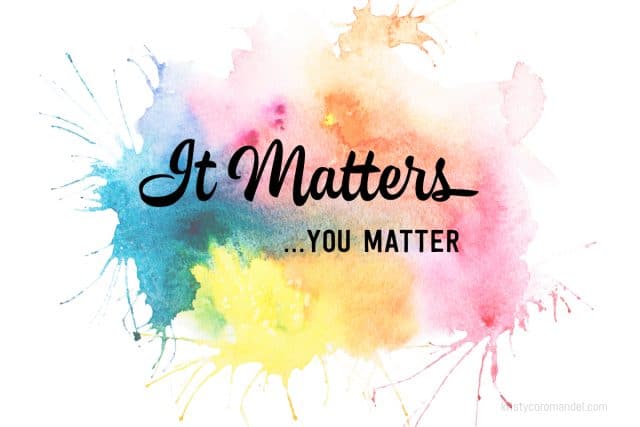Went to church yesterday, and the sermon was about different ways that Jesus defines himself in different portions of the Bible — actually, I think all these definitions are within the book of John — such as “I am the gate” or “I am the bread of life,” etc. At the end, in trying to tie different things together, the pastor said something like “Everyone wants to matter.” That resonated with me, even though as I looked around the church, probably 35% of people were on their phones at that moment. I have a constant desire to be seen — it’s probably part of, if not the entirety of, why I drink — and I think that belonging and inclusion are some of the heartbeats of the human condition, even if they’ve been co-opted into shitty HR buzzwords for our professional lives.
I posted something akin to “People just want to feel as if they matter” on Facebook later in the day (boredom), and in true social media fashion, most of the comments were about the use of the word “just” — “I have problems thinking humans just want to do any one thing, Ted” — or about what the word “matter” means. I suppose both are valid criticisms of the post, but also wholly indicative of the social media semantics rabbit hole we often fall into.
I don’t know if there is an universally-accepted definition for “matter,” but I would say feeling like people care about you, care about your well-being, know something about your life, see you, reach out to you, want to organize things with you, etc. It’s a process of being seen and belonging to something, which obviously can be tricky in adulthood. Adulthood is a racket because different people do different things according to different timelines, which is not the case for most people from age 0-23, minus teen pregnancies and YouTube stars. Because someone might have three kids by 30 or one kid by 45, and because people move for work and friendships wax and wane, early-to-mid adulthood can get very divergent, and friendships and connections can feel frayed even if they’re not. It can sometimes be hard to feel like you “matter,” even if you first want to spend 45 minutes defining “matter.” This is all what leads me to write articles like “What are the expectations of friendship?” I still don’t entirely know that answer, FYI.
Here’s a few small “mattering” examples for you: after church yesterday, my church small group came back to my house for discussion. Near the end of it, two other guys are leaving to play golf together. I’m a guy. I don’t golf well, but guys golf and it’s one way they do stuff together, and I hadn’t heard of this outing or been invited, and now in my house they’re bringing it up. Feel like I matter? Not in that moment.
Earlier in the weekend, a friend I thought was out of town texted me that he was going on a boat with some other friends of mine. Had no real idea of any of this. Feel seen? Belonged? Mattered? Not necessarily.
I’ve written about this before — it’s not contextually or conceptually that hard to just reach out to people and see what’s up with them. I try to do it daily. Now, sometimes my messaging might be off-task and f’ed up, without question, but I still do it. I have people I, at one time, considered pretty close friends and I bet if I never texted them, I’d never hear from them again while we’re both among the living. And honestly, I don’t fucking get it. I guess I either slipped down their chart (logical) or they get busy with life in ways that I don’t. I mostly find the work side of life to be easy — sometimes you get jammed up on deadlines and tasks, but a lot of times it’s just “keep your head down and follow the leader,” and if you do that, you can pretty much have a good deal of autonomy. I never understood people telling me they stay at work until 10:30 on a Thursday. Like, why? Sense of self? Maybe I’m wired differently.
So even if we don’t know the absolute and total definition of what it means to “matter,” I do think most humans want to feel they matter in some way, be it as a friend, a dad, a mom, a partner, a co-worker, a volunteer, etc.
If we could move through life remembering this and helping people to feel as if they matter, as opposed to being an afterthought, that would be a better world, no?

Adulthood is like a never-ending episode of the post-first date game: Will he call me? Should I call her? It’s been three days, oh god…